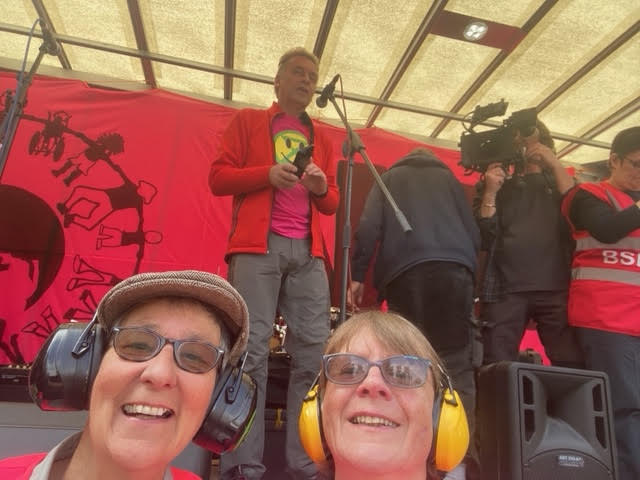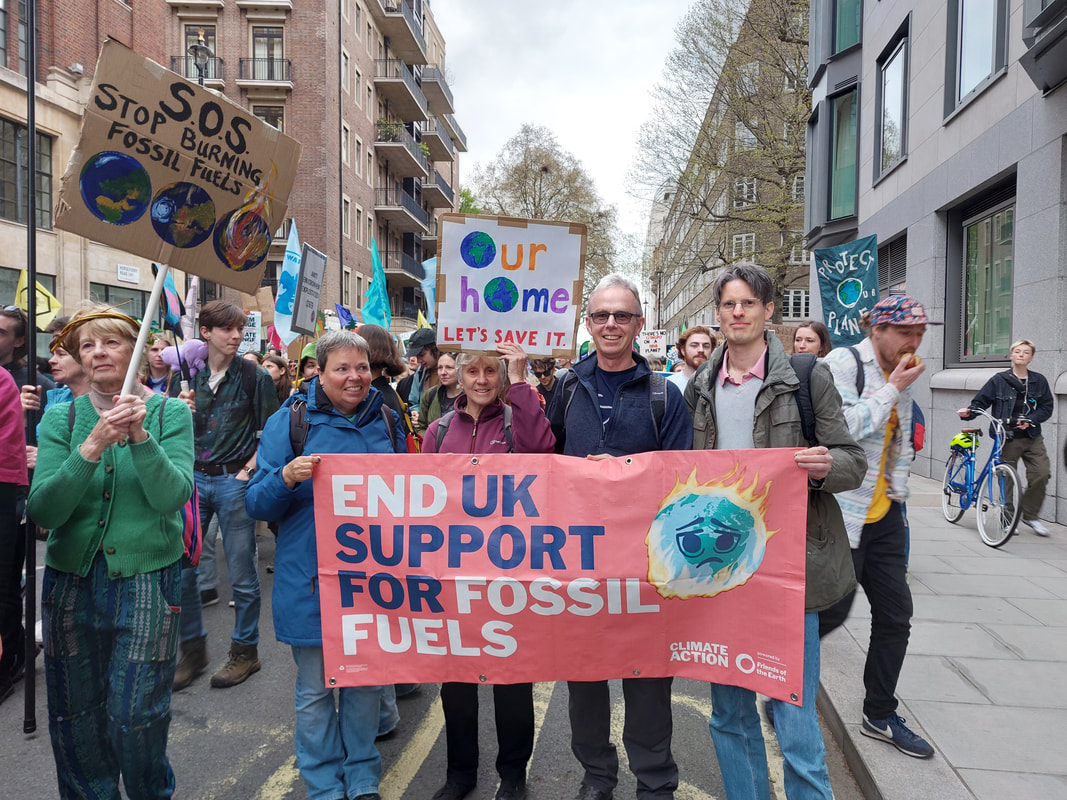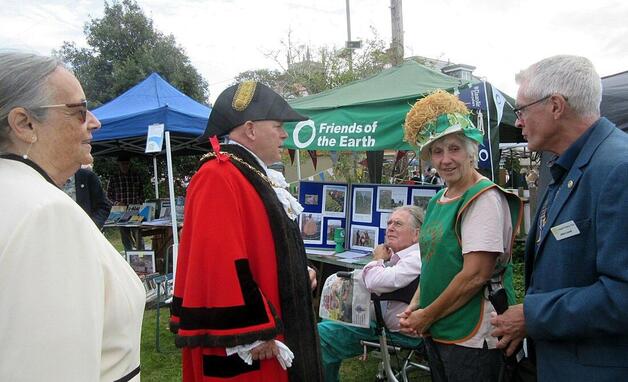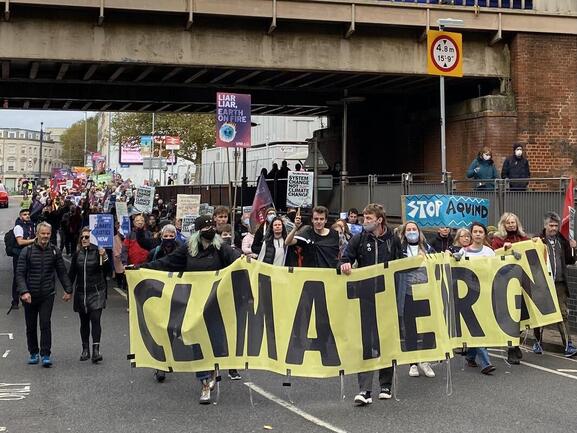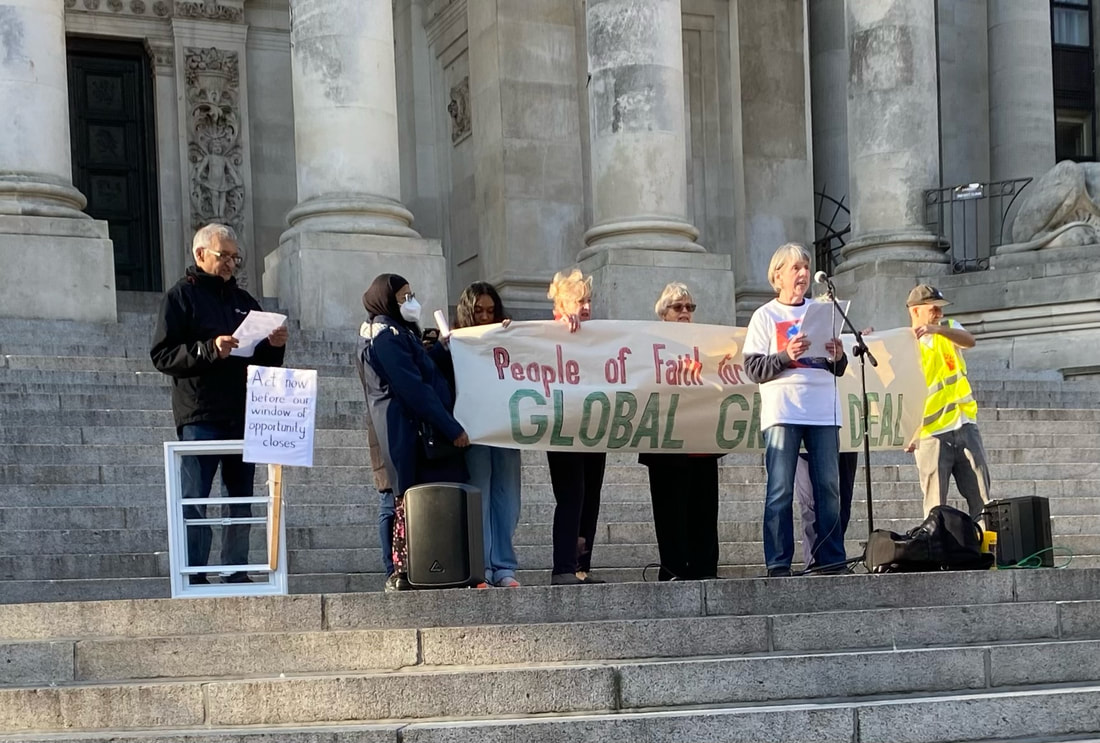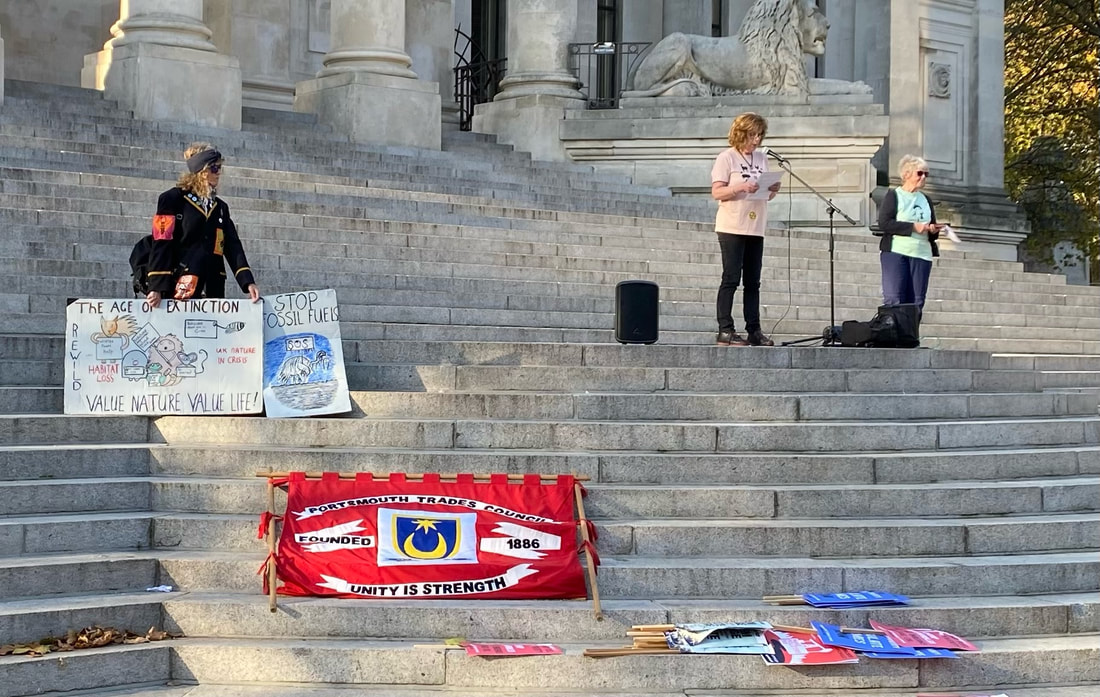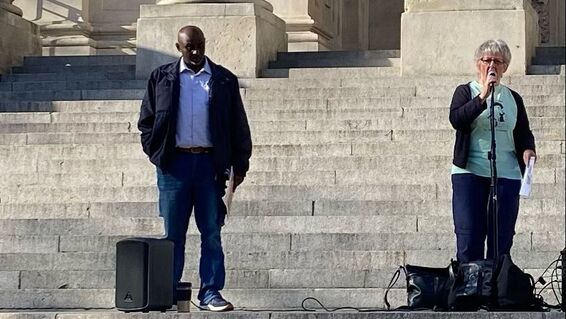|
Climate Change is one of our main areas of concern. GFFOE are actively supporting the work of our local councils in the need to reduce carbon emissions and build resilience. GFFOE have a representative on the Gosport Climate Change Partnership and we attend meetings and make regular deputations to the Fareham Borough Council Climate Change Scrutiny Panel. The deputations are available for you to read if you scroll to the bottom of this page.
We also have a representative on the Hampshire County Council Expert Stakeholder Forum on Climate Change We actively support the work of the South East Climate Alliance ( SECA) SECA on Facebook and the Hampshire Climate Action Network ( HCAN) : HCAN on Facebook |

Climate Action Statistics for Gosport
Gosport Borough Council Climate Change
Gosport Climate Change Partnership
Gosport Borough Council Climate Change
Gosport Climate Change Partnership

Climate Action Statistics for Fareham
Fareham Borough Council Climate Change Website
Fareham Borough Council Climate Change Scrutiny Panel
Fareham Borough Council Climate Change Website
Fareham Borough Council Climate Change Scrutiny Panel

Hampshire Council Council Climate Change information
Hampshire County Council Expert Stakeholder Forum on Climate Change
Hampshire County Council Expert Stakeholder Forum on Climate Change
Gosport & Fareham Friends of the Earth at "The Big One" Climate Demonstrations 21-24 April 2023
|
5 of our members attended one or more days of the Big One [link https://extinctionrebellion.uk/the-big-one/], an event organised by XR where many groups including GFFOE held politicians to account. We wanted them to know, we didn't (entirely!) have faith that they would act to prevent the looming disaster that climate, nature and humanity face.
One of our members was helping on Access and Inclusion … so got to be at the front listening to Chris Packham !! One of the first speakers in Parliament Square was a young woman, Tamara Ullyart from Friends of the Earth. Her speech was really moving and she kindly said she would share it and pass it on to people who couldn’t be there/ weren’t able to hear her words.
|
GFFoE joined the march from parliament square, which ended with a "Die In" to represent the dawning threat of catastrophic climate change.
Climate march in Portsmouth and "panto on the beach" for COP26
|
In November 2022 in response to COP27, GFFoE took part of the "Global Day of Action for Climate Justice". We updated our panto and performed it in front of the crowd in the Guildhall Square Portsmouth after carrying banners and placards on the march through the city centre. There is an account of the whole day on the Blog page.
|
|
|
The ‘climate stripes’ graphic was made at Reading by climate scientist Professor Ed Hawkins: Annual temperatures in central England from 1772-2017:
The graphic, first produced in 2017, uses a coloured stripe to represent the global average temperature for each year since 1850, with blue for cooler temperatures and red for hotter years. The thick band of deep red stripes that appear towards the right end of the graphic are a stark visual representation of how human action has heated the climate over time. The colour scale goes from 7.6°C (dark blue) to 10.8°C (dark red). |
Deputations we have made to the FBC Climate Change Scrutiny Panel
Deputation to the Planning and Development Scrutiny Panel 14th March 2024
We, Gosport and Fareham Friends of the Earth, are asking Fareham Borough Council to formally support the CE bill.
If the C is climate we might guess that the E is emergency but no it’s ecology.
The bill has 3 asks:
ASK 1: Make sure the UK cuts its emissions fairly and fully to stand the best chance of keeping 1 point 5 C alive (that’s no more than 1 point 5 degrees Celsius of global warming).
Why? We are living at a critical time for our planet – human activity has increased carbon emissions and heated the planet to the point where climate is rapidly changing. This threatens our global food supply and the homes of millions, and if we leave things too long, billions of people. We are starting to realise how lucky we have been to live in an era so well suited to human life and how much harder things could get.
But hasn’t the UK already cut its C O 2 equivalent emissions by 48%? Yes, but no.
This figure doesn’t include emissions arising from our consumption of imported goods, aviation and shipping. The Climate and Ecology Bill recognises that we must include all emissions, and when we do, we find that our reduction, to date, is less than 20%. This reduction isn’t fast enough, the first 20% was easiest, the next 20% will be a bit harder and so on … and if we don’t cut fast (because we are continuing to fill up our atmosphere with climate change emissions) the burden on the next generations will increase, and they will have less energy available to effect change.
As the Fareham’s Greener Future document explains, Fareham Borough Council has worked hard to reduce emissions. BUT what about the emissions beyond those of the Borough Council?: the emissions that occur throughout the borough.
About a quarter of C O 2 equivalent emissions are from using buildings. Making sure new buildings and extensions are constructed to the highest standards will save us in the future. Building a low carbon home costs £8000 more than building to the current, energy leaky, standards. BUT retrofitting a newly built house, to take it from a high carbon to a low carbon house costs over
£30 000. Not to mention an extra £1000 each year in energy costs, whilst we save up to make those retrofit changes.
I’m estimating we have about 50 000 homes in the Borough of Fareham. Fareham’s Greener Future explains how almost 500 homes have had energy efficiency changes made by Fareham Borough Council. That’s less than 1%. All councils will need more help from the Government, to retro-fit the entire housing stock fast enough, to make sure the UK cuts emissions fast enough to give us all a liveable future.
It’s great that the worst air quality emissions have been monitored and tackled, through the E1/E2 bus routes and some safer cycling routes. However the World Health Organisation says the public health emergency due to air quality affects over 90% of the population with head-to-toe harm: heart and lung disease, diabetes, dementia, liver problems, bladder cancer, brittle bones, damaged skin, fertility loss and damage to foetuses and children. So tackling only the worst air quality isn’t enough.
About a quarter of C O 2 equivalent emissions are due to transport. People powered transport for local journeys would improve our health, but tell me a pedestrian or cyclist in Fareham that feels safer now than they did a decade ago, to walk or cycle to wherever they wish from their home? Again help is needed on a national level so Fareham Borough Council can do more locally.
About a quarter of UK emissions are from industry and the remaining quarter is from agriculture. Again responsibility for these falls squarely at a national level.
To get to net zero fast enough, we need a big shift at the national level.
Now to the 2nd ASK of the CE bill: Make sure the UK reverses the destruction of nature by 2030
Fareham’s Greener Future says “ environment incorporates so much more than carbon reduction”. Just so, BUT can’t we wait until we’ve fixed climate before we fix nature?
No. We can’t effectively tackle climate change without also protecting nature.
Our activities are altering the natural world, reducing wild habitats and causing extinction of species, not just in the UK but globally. We depend on nature but we are polluting the air we breathe, the water we drink and the soil in which we grow our food. These problems are interrelated and threaten the future of our planet as a human home.
The ecological emergency, requires us to act now, as there is a rapidly narrowing window of opportunity to stop the damage spiralling out of control.
Won’t wildflower areas and increasing tree coverage alongside the Council’s enactment of The Environment Act be enough?
No, because the Environment Act plans to halt the decline in nature by 2030, whereas the CE bill plans to reverse the destruction of nature by 2030.
No, because the Environment Act ignores the impact of our consumption on nature around the world.
No, because to reach the targets that the UK signed at the UN Biodiversity Summit in 2022, requires the reach of the CE bill to change those targets into legislation.
Now to the 3rd and final ASK of the CE bill: Involve citizens in deciding the fairest way forward.
At least 2/3 of UK voters are “worried about climate change and its effects”, and it’s likely to be a higher proportion of children and young people, that is future voters.
As citizens, we feel that climate is a big concern: we hope that electric cars and a bit of recycling will be enough, but deep down we expect that it won’t be. We also fear that time is running out (but think that it must be ok, if no one in government is talking about or planning big changes). This uncertainty increases our anxiety.
Governments have put too much hope that a technology fix, such as carbon capture, will mean that we wouldn’t need to change our business-as-usual behaviours. Engineers are telling us that the energy costs and pace of change mean that techno-fix won’t be fast enough, effective enough nor economically viable. We need to change the way we do things … and fast.
Transitioning away from fossil fuels means making big changes in our lives. It is important that everyone is on board with them, which means changes need to be seen as fair and necessary. Therefore, the CE Bill calls for a climate and nature assembly to help the Government and Parliament develop an emergency strategy on the way forward, including ensuring that those who need to change jobs are properly supported to do so.
I’ve just been re-watching Foyle’s war and when I consider the sacrifices that the people of the UK made, how unpalatable their food was, how many people needed to change their job, how many people were injured and died - I think the Climate and Ecology Bill will ask so much less of us.
When I think of how responsibly almost all of us responded to the asks by the government during the worst of the covid crisis. I think, yes, the vast majority of us would be happy to make the changes needed.
But ONLY if we realised what the future would hold if we didn’t and ONLY if we thought the changes were fair.
Are we asking Fareham Borough Council to enact the CE Bill, the Climate and Ecology Bill? No.
What we are asking is that
If the C is climate we might guess that the E is emergency but no it’s ecology.
The bill has 3 asks:
- Make sure the UK cuts its emissions fairly and fully to stand the best chance of keeping 1 point 5 C alive.
- Make sure the UK reverses the destruction of nature by 2030.
- Involve citizens in deciding the fairest way forward.
ASK 1: Make sure the UK cuts its emissions fairly and fully to stand the best chance of keeping 1 point 5 C alive (that’s no more than 1 point 5 degrees Celsius of global warming).
Why? We are living at a critical time for our planet – human activity has increased carbon emissions and heated the planet to the point where climate is rapidly changing. This threatens our global food supply and the homes of millions, and if we leave things too long, billions of people. We are starting to realise how lucky we have been to live in an era so well suited to human life and how much harder things could get.
But hasn’t the UK already cut its C O 2 equivalent emissions by 48%? Yes, but no.
This figure doesn’t include emissions arising from our consumption of imported goods, aviation and shipping. The Climate and Ecology Bill recognises that we must include all emissions, and when we do, we find that our reduction, to date, is less than 20%. This reduction isn’t fast enough, the first 20% was easiest, the next 20% will be a bit harder and so on … and if we don’t cut fast (because we are continuing to fill up our atmosphere with climate change emissions) the burden on the next generations will increase, and they will have less energy available to effect change.
As the Fareham’s Greener Future document explains, Fareham Borough Council has worked hard to reduce emissions. BUT what about the emissions beyond those of the Borough Council?: the emissions that occur throughout the borough.
About a quarter of C O 2 equivalent emissions are from using buildings. Making sure new buildings and extensions are constructed to the highest standards will save us in the future. Building a low carbon home costs £8000 more than building to the current, energy leaky, standards. BUT retrofitting a newly built house, to take it from a high carbon to a low carbon house costs over
£30 000. Not to mention an extra £1000 each year in energy costs, whilst we save up to make those retrofit changes.
I’m estimating we have about 50 000 homes in the Borough of Fareham. Fareham’s Greener Future explains how almost 500 homes have had energy efficiency changes made by Fareham Borough Council. That’s less than 1%. All councils will need more help from the Government, to retro-fit the entire housing stock fast enough, to make sure the UK cuts emissions fast enough to give us all a liveable future.
It’s great that the worst air quality emissions have been monitored and tackled, through the E1/E2 bus routes and some safer cycling routes. However the World Health Organisation says the public health emergency due to air quality affects over 90% of the population with head-to-toe harm: heart and lung disease, diabetes, dementia, liver problems, bladder cancer, brittle bones, damaged skin, fertility loss and damage to foetuses and children. So tackling only the worst air quality isn’t enough.
About a quarter of C O 2 equivalent emissions are due to transport. People powered transport for local journeys would improve our health, but tell me a pedestrian or cyclist in Fareham that feels safer now than they did a decade ago, to walk or cycle to wherever they wish from their home? Again help is needed on a national level so Fareham Borough Council can do more locally.
About a quarter of UK emissions are from industry and the remaining quarter is from agriculture. Again responsibility for these falls squarely at a national level.
To get to net zero fast enough, we need a big shift at the national level.
Now to the 2nd ASK of the CE bill: Make sure the UK reverses the destruction of nature by 2030
Fareham’s Greener Future says “ environment incorporates so much more than carbon reduction”. Just so, BUT can’t we wait until we’ve fixed climate before we fix nature?
No. We can’t effectively tackle climate change without also protecting nature.
Our activities are altering the natural world, reducing wild habitats and causing extinction of species, not just in the UK but globally. We depend on nature but we are polluting the air we breathe, the water we drink and the soil in which we grow our food. These problems are interrelated and threaten the future of our planet as a human home.
The ecological emergency, requires us to act now, as there is a rapidly narrowing window of opportunity to stop the damage spiralling out of control.
Won’t wildflower areas and increasing tree coverage alongside the Council’s enactment of The Environment Act be enough?
No, because the Environment Act plans to halt the decline in nature by 2030, whereas the CE bill plans to reverse the destruction of nature by 2030.
No, because the Environment Act ignores the impact of our consumption on nature around the world.
No, because to reach the targets that the UK signed at the UN Biodiversity Summit in 2022, requires the reach of the CE bill to change those targets into legislation.
Now to the 3rd and final ASK of the CE bill: Involve citizens in deciding the fairest way forward.
At least 2/3 of UK voters are “worried about climate change and its effects”, and it’s likely to be a higher proportion of children and young people, that is future voters.
As citizens, we feel that climate is a big concern: we hope that electric cars and a bit of recycling will be enough, but deep down we expect that it won’t be. We also fear that time is running out (but think that it must be ok, if no one in government is talking about or planning big changes). This uncertainty increases our anxiety.
Governments have put too much hope that a technology fix, such as carbon capture, will mean that we wouldn’t need to change our business-as-usual behaviours. Engineers are telling us that the energy costs and pace of change mean that techno-fix won’t be fast enough, effective enough nor economically viable. We need to change the way we do things … and fast.
Transitioning away from fossil fuels means making big changes in our lives. It is important that everyone is on board with them, which means changes need to be seen as fair and necessary. Therefore, the CE Bill calls for a climate and nature assembly to help the Government and Parliament develop an emergency strategy on the way forward, including ensuring that those who need to change jobs are properly supported to do so.
I’ve just been re-watching Foyle’s war and when I consider the sacrifices that the people of the UK made, how unpalatable their food was, how many people needed to change their job, how many people were injured and died - I think the Climate and Ecology Bill will ask so much less of us.
When I think of how responsibly almost all of us responded to the asks by the government during the worst of the covid crisis. I think, yes, the vast majority of us would be happy to make the changes needed.
But ONLY if we realised what the future would hold if we didn’t and ONLY if we thought the changes were fair.
Are we asking Fareham Borough Council to enact the CE Bill, the Climate and Ecology Bill? No.
What we are asking is that
- Fareham Borough Council formally supports the bill, (when I started writing this 337 local councils including Winchester City Council had supported it and today the total is 351)
- Fareham Borough Council publicises and explains this support alongside Fareham’s Greener Future.
Deputation to FBC CCSP on 4-7-23
Deputation to FBC CCSP 4th July 2023 by Andy Rolfe, Fareham PO14 3ER, representing G&FFoE
Thank you for the opportunity to speak at today’s scrutiny panel. It is heartening to see the commitment of everyone here to achieve the FBC target of carbon neutral by 2030, and to lead and inspire broader change across the whole Borough.
Previous deputations given by GFFoE to the CCSP have been reinforced by another warning about the impacts of anthropomorphic climate change and the actions to address it. Today, I draw your attention to a statement from the independent Climate Change Committee.
The government doesn’t have credible plans for over four-fifths of the cuts in emissions needed . Worryingly, almost half of these cuts either have plans with significant risk or no credible plans at all.
The outgoing CCC chair Lord Deben has stated that the biggest lesson of his 10 years at the CCC is that early action benefits the people of this country and helps us to meet the challenges of the coming decades more cheaply and more easily.
The energy price shock of last Winter would have been much less if we had made more progress on reducing our dependence on fossil fuels?
For tonight’s agenda, we wish to highlight the following points for your consideration.
Agenda details
Agenda Item 2.
At the last CCSP we received a detailed presentation from the Head of Building Control Partnership, providing an overview of the building regulations that are being introduced by the government to reduce the carbon footprint of new and existing buildings. This prompts mention of Reading Borough Council’s Local Plan which already requires new residential developments of ten or more homes to be built to zero carbon standards. Can this CCSP challenge the FBC local plan to match this?
Agenda Item 6. Carbon Footprint
Whilst the data for 2022 / 23 shows a continued improvement in the carbon footprint, the current trend implies that the 2030 target will not be met. This is further compounded by the fact that it will become more difficult to cut emissions as time goes on because we will have already tackled the ‘easy ‘ changes that can be made (for example switching to a renewable energy provider, reducing energy use by retrofitting insulation etc).
Agenda Item 7. Climate Change Action Plan Update
We welcome this update, showing progress in reducing our carbon footprint and also encouraging biodiversity.
We ask the CCSP to consider if the rate of progress is sufficient and whether the remaining work is credible in terms of finance, technology and timescales.
Agenda Item 9: Executive Business.
It’s been previously stated - “Members queried their ability to influence the Executive to make changes to the Climate Change Action Plan (CCAP).”
Many previous Scrutiny Panels have concluded with “There were no items of Executive Business for the Panel to consider” and yet all Council decisions will have some bearing on emissions and therefore relate to the performance of the CCAP and our progress towards our net zero target.
Is the Scrutiny Panel confident that the Executive are being guided by the CCAP in all they do, or do they put it aside due to other priorities? If this Scrutiny Panel does not hold the Executive to account over this no one else will. Does anyone on the FBC Executive have a clear remit for Climate Change?
Thank you for this opportunity and your kind attention.
Thank you for the opportunity to speak at today’s scrutiny panel. It is heartening to see the commitment of everyone here to achieve the FBC target of carbon neutral by 2030, and to lead and inspire broader change across the whole Borough.
Previous deputations given by GFFoE to the CCSP have been reinforced by another warning about the impacts of anthropomorphic climate change and the actions to address it. Today, I draw your attention to a statement from the independent Climate Change Committee.
The government doesn’t have credible plans for over four-fifths of the cuts in emissions needed . Worryingly, almost half of these cuts either have plans with significant risk or no credible plans at all.
The outgoing CCC chair Lord Deben has stated that the biggest lesson of his 10 years at the CCC is that early action benefits the people of this country and helps us to meet the challenges of the coming decades more cheaply and more easily.
The energy price shock of last Winter would have been much less if we had made more progress on reducing our dependence on fossil fuels?
For tonight’s agenda, we wish to highlight the following points for your consideration.
Agenda details
Agenda Item 2.
At the last CCSP we received a detailed presentation from the Head of Building Control Partnership, providing an overview of the building regulations that are being introduced by the government to reduce the carbon footprint of new and existing buildings. This prompts mention of Reading Borough Council’s Local Plan which already requires new residential developments of ten or more homes to be built to zero carbon standards. Can this CCSP challenge the FBC local plan to match this?
Agenda Item 6. Carbon Footprint
Whilst the data for 2022 / 23 shows a continued improvement in the carbon footprint, the current trend implies that the 2030 target will not be met. This is further compounded by the fact that it will become more difficult to cut emissions as time goes on because we will have already tackled the ‘easy ‘ changes that can be made (for example switching to a renewable energy provider, reducing energy use by retrofitting insulation etc).
Agenda Item 7. Climate Change Action Plan Update
We welcome this update, showing progress in reducing our carbon footprint and also encouraging biodiversity.
We ask the CCSP to consider if the rate of progress is sufficient and whether the remaining work is credible in terms of finance, technology and timescales.
Agenda Item 9: Executive Business.
It’s been previously stated - “Members queried their ability to influence the Executive to make changes to the Climate Change Action Plan (CCAP).”
Many previous Scrutiny Panels have concluded with “There were no items of Executive Business for the Panel to consider” and yet all Council decisions will have some bearing on emissions and therefore relate to the performance of the CCAP and our progress towards our net zero target.
Is the Scrutiny Panel confident that the Executive are being guided by the CCAP in all they do, or do they put it aside due to other priorities? If this Scrutiny Panel does not hold the Executive to account over this no one else will. Does anyone on the FBC Executive have a clear remit for Climate Change?
Thank you for this opportunity and your kind attention.
Your browser does not support viewing this document. Click here to download the document.
Your browser does not support viewing this document. Click here to download the document.
Your browser does not support viewing this document. Click here to download the document.
Your browser does not support viewing this document. Click here to download the document.
Your browser does not support viewing this document. Click here to download the document.
Your browser does not support viewing this document. Click here to download the document.

